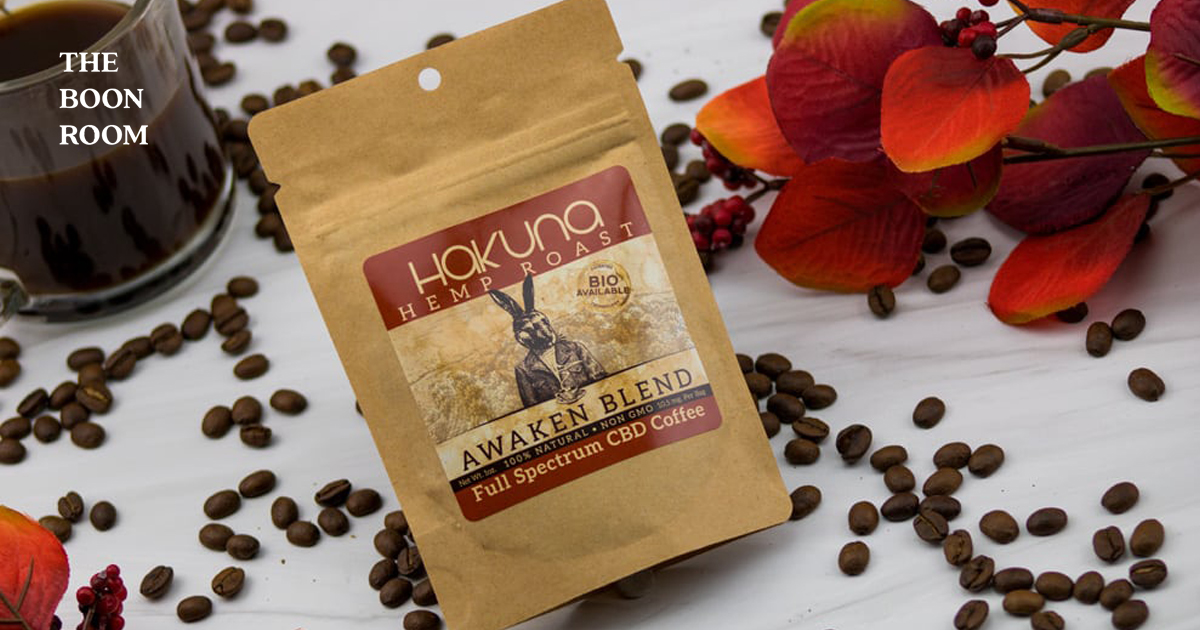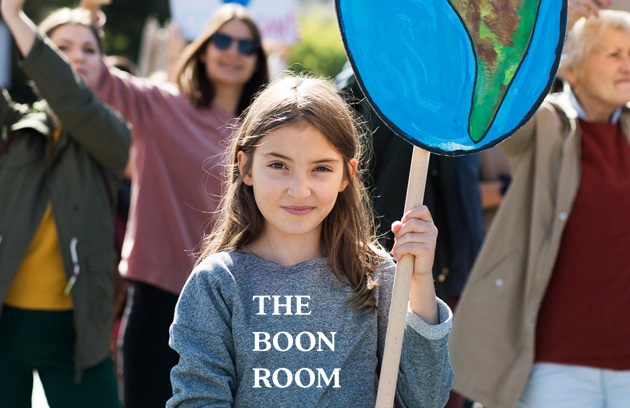Coffee has been long-established around the world. But, what about CBD and coffee? The rise in popularity of cannabidiol (CBD) is much more recent by comparison, but many people are discovering that the pairing of coffee and CBD can enhance the experience of consuming both.
What Is CBD?
CBD is a non-psychotropic compound derived from the cannabis plant. CBD can be harvested in large quantities from industrial hemp, which contains much more CBD production capability than tetrahydrocannabinol (THC). It is important to note the difference between the two compounds: THC actively provides the “high” associated with marijuana, while CBD has been found to have positive impacts on such ailments as anxiety, depression, and seizure disorders.
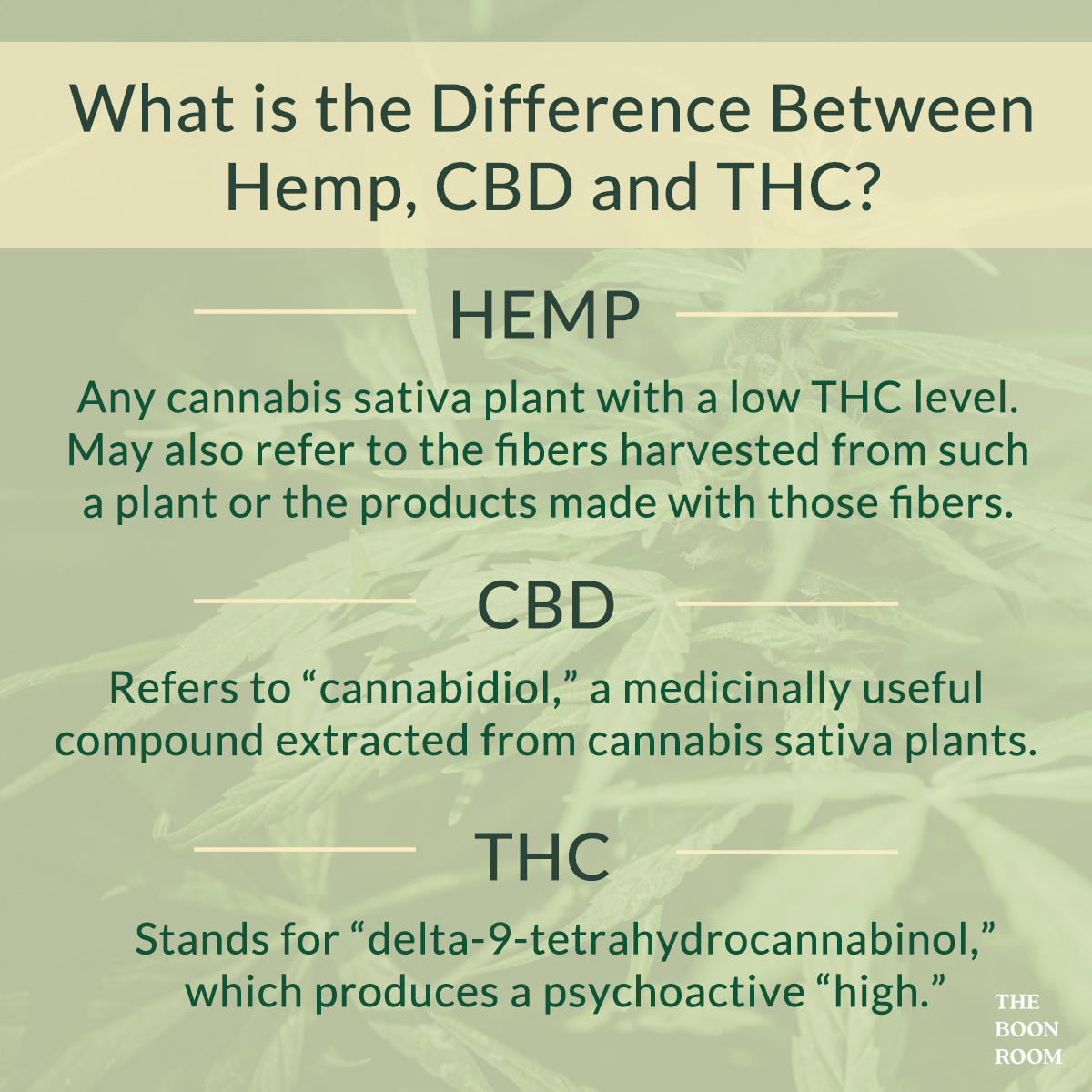
While CBD has long been viewed skeptically or with outright negative connotations due to its close relationship to other cannabinoids like THC, it’s seizing a larger share of the health supplement marketplace and only stands to increase over the next several years.
With access to research increasing, the medical benefits of CBD could be more wide-ranging, Anecdotal evidence and initial research note the compound’s uses as a non-addictive substance for treating chronic pain. However, the U.S. Food and Drug Administration has now approved limited medicinal uses for CBD and has been slow to approve medicines using it as an ingredient.
CBD is presently more common as a non-FDA-regulated supplement rather than a prescribed treatment, although clinical trials to establish the best dosage ratios and ingestion methods are ongoing. As a result, a variety of oils, pills, gummies, edibles, and beverages has emerged with many satisfied users finding their own preferred method to add CBD to their health regimen.
Is CBD and Coffee Legal?
In most cases, adding CBD to your own coffee is permitted. While marijuana is still barred under federal law, despite a growing number of legalizing measures for both medical and recreational marijuana in many states, the opposite is the case for CBD. Federal laws don’t prohibit CBD, and the growing of industrial hemp has increased the availability of CBD, though state laws still vary widely. Knowing what your state permits is a good start for knowing where to shop for CBD products and what you can purchase locally.
Does CBD Oil Work in Coffee?
Many health supplements maintain their potency when mixed with coffee, and CBD is certainly one of them. If you’re already an avid coffee drinker, adding a little CBD oil to a cup of coffee can be a fantastic way to try out CBD for the first time. However, there are a few things to note regarding CBD oil and coffee.
First, coffee is a water-based beverage, and CBD oils are obviously oil-based liquids. That means your CBD oil will not mix evenly with your coffee but instead float beautifully on top.
If you’d like a more uniformly blended CBD coffee beverage, try a water-soluble coffee drop product, or consider trying pre-made CBD coffee instead.
How Does CBD and Coffee Make You Feel?
The combination of CBD and coffee provides the opportunity to experience the best benefits of each. The caffeine content of coffee produces the beverage’s most widely accepted benefit—perking up tired parents on weekend mornings, the on-the-go professional racing to work on Monday, or the undergrad slaving over a term paper into the wee hours of the morning.
A stiff dose of caffeine can also lead some people to experience jittery feelings, which may be even more pronounced for those who experience anxiety. CBD’s calming effect allows some people to get the boost of the coffee without the jitters.
From a taste perspective, CBD can also be added with minimal or no noticeable impact on taste. Whether you’re buying coffee to brew with CBD already infused or adding a few drops of CBD oil to an already brewed cup, the CBD won’t overpower your cream and sugar.
Why Put CBD Oil in Coffee?
Both coffee and CBD have their own documented benefits, many of which we’ve noted above. However, while coffee is often celebrated for its energizing qualities, CBD is popular because it has calming qualities. In fact, that’s exactly why the two work so well together—and the basis behind why you should consider CBD and coffee.
For all its benefits, coffee does have one drawback—it may increase cortisol levels in the body. This stress hormone can contribute to the jittery feeling mentioned earlier. Counteracting cortisol with CBD’s relaxing properties can help you reach the ideal balance of uplifted and relaxed you need to approach your day with confidence.
This balance can also help you:
- Boost your concentration. CBD in low doses may help promote wakefulness and address other mental health issues that can be distracting, qualities it shares with coffee.
- Boost your brain function. CBD has already been examined for its ability to improve the way neurons communicate with one another, and both CBD and caffeine can impact key neurotransmitters like adenosine.
- Boost your mood. Both caffeine and CBD can have a positive effect on the way the body produces or uses serotonin, a known mood boosting neurotransmitter.
The Best Ways to Enjoy CBD and Coffee
The best way to enjoy CBD in your coffee is all about personal preference. The options are as endless and varied as the styles of coffee and CBD products available. Here are our favorite ways to infuse your coffee with CBD.
Mix Your Coffee With CBD Oil
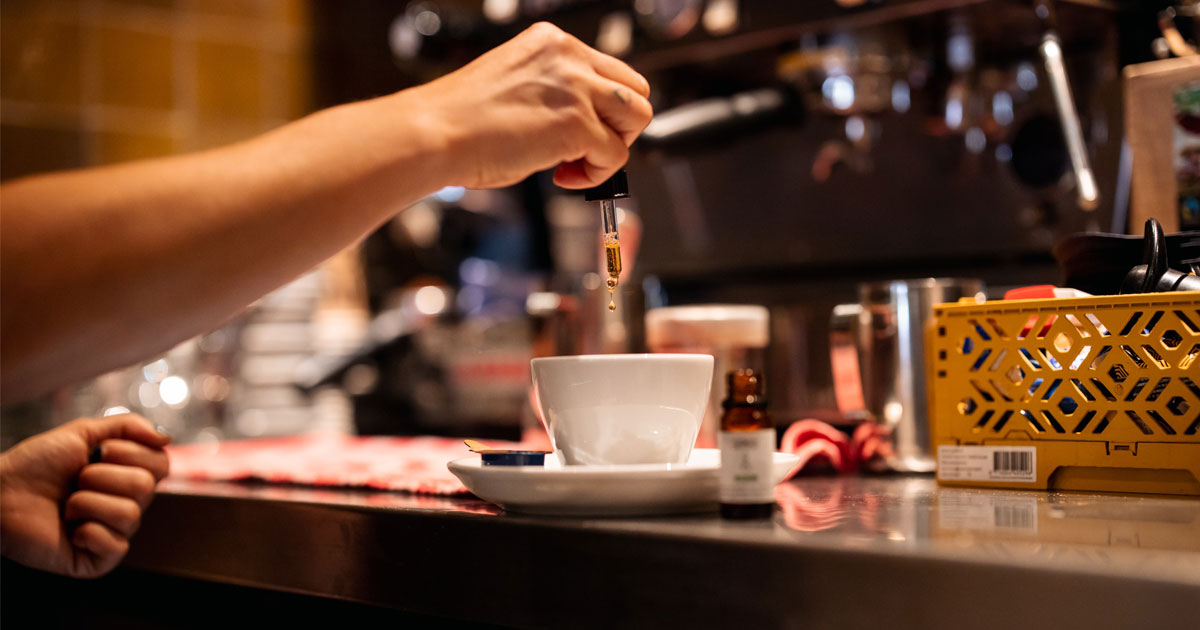
This option is as simple as it gets. Just pour your regular dose of your chosen CBD oil into hot or iced coffee and stir. Remember, you won’t be able to fully incorporate the oil into your brew, so be sure to consume it as soon as it cools to avoid losing oil to the sides of your mug.
Stir CBD Tincture Into Your Coffee [H3] Unlike oil, tinctures are water-soluble and can be fully blended with a water-based beverage like coffee. Simply stir a few drops of your chosen tincture into hot or iced coffee and enjoy.
Infuse Local Honey With CBD [H3] If you prefer your java a bit sweeter, you can get the taste you want and the CBD you need all in one easy step. You can purchase CBD-infused honey from many online retailers or dispensaries.
Brew Infused CBD Beans
While adding your own CBD to your coffee at home gives you the ultimate control over every aspect of your beverage, including the strain, dose, flavor properties, and therapeutic properties of the CBD and the roast, aroma, caffeine level, and strength of the coffee, there are benefits to choosing a pre-infused CBD bean. For example, you’ll eliminate a step on your way to your morning CBD brew, and you’ll likely find it a bit easier to gauge your dose based on the information provided on the packaging.
Hakuna Supply’s Hemp Roast Coffee, even includes decaffeinated options if caffeine isn’t your jam.
Enjoy Tea Instead
If coffee isn’t your cup of tea, perhaps CBD tea is your cup of tea! Teas are another effective delivery method for CBD, and the options listed above work extremely well for both hot and iced tea.
Hakuna Supply also boasts several CBD-infused teas if you’d rather purchase a ready-made option you don’t need to infuse.
CBD and Coffee Tips:
While adding CBD to your coffee is as easy as it comes, we do have a few tips to make your experience even smoother—both for yourself and for the environment.
Make Sure to Stir
Whether you use CBD oil or tinctures, it’s important to stir vigorously to incorporate the CBD into your coffee. While CBD oils will not uniformly mix with the coffee, stirring does break up the layer of oil that rests atop your coffee. Stirring your CBD tincture will help ensure it is distributed evenly.
Try Adding Milk or Cream
Both coffee and teas mixed with CBD can benefit from the use of whole milk, cream, or butter. These products add a creamy taste many people prefer. Better yet, the fats that create this wonderful creaminess help your body absorb the CBD. If you don’t tolerate dairy well, try coconut oil.
Be Sure to Be Sustainable
Since hemp is a sustainable resource used to create many products, it’s important for CBD coffee drinkers to follow sustainable practices. The use of single-serve K-cups has become one of the primary methods of brewing coffee in America, but the majority of them are tossed away to wind up in landfills. Learn more about how to recycle K-cups or reuse them for other purposes.
The Future for CBD Coffee
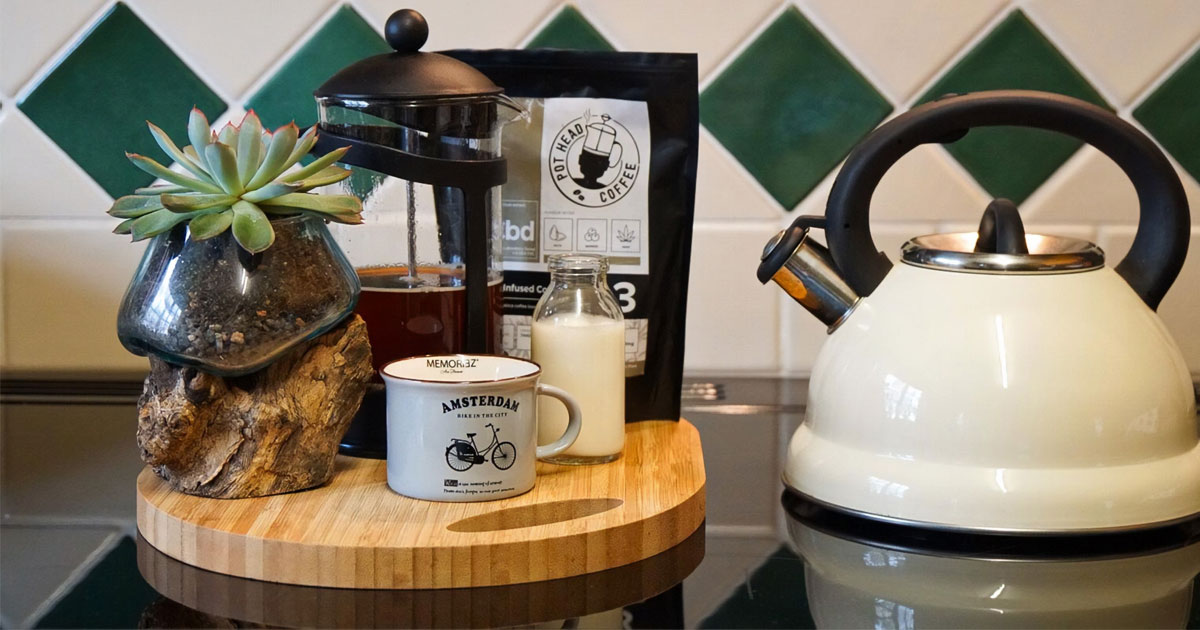
CBD is here to stay. Popularity for medical and personal use has shown steady growth, and state regulations limiting CBD are likely to ease as quickly if not more so than the expansion of legalized marijuana. The size of revenue generated by CBD as an industry in the U.S. alone more than doubled from 2020 to 2021. It is projected to exceed $6 billion in 2022 and swell to more than $22 billion by the start of the next decade. How much of that market share will be made up of the coffee industry is too early to tell, but it will be a factor.
Accessibility to CBD will aid growth. Earlier this year, Food & Function highlighted advancements in preserving the chemical values of CBD in functional foods, including beverages. The ability for CBD to be mixed in wider arrays of food and beverage and stored at varying temperatures over longer periods increases the viability of CBD in mainstream distribution markets.
Sources
- Silmore, L. H., Willmer, A. R., Capparelli, E. V., & Rosania, G. R. (2021). Food effects on the formulation, dosing, and administration of cannabidiol (CBD) in humans: A systematic review of clinical studies. Pharmacotherapy: The Journal of Human Pharmacology and Drug Therapy, 41(4), 405-420. https://doi.org/10.1002/phar.2512
- McFadden, B. R., & Malone, T. (2021). Homegrown perceptions about the medical use and potential abuse of CBD and THC. Addictive behaviors, 115, 106799. https://doi.org/10.1016/j.addbeh.2020.106799
- Chan, M. Z. A., & Liu, S. Q. (2022). Coffee brews as food matrices for delivering probiotics: Opportunities, challenges, and potential health benefits. Trends in Food Science & Technology, 119, 227-242. https://doi.org/10.1016/j.tifs.2021.11.030
- Grand View Research. (2022). Cannabidiol Market Size, Share & Trends Analysis Report By Source Type (Hemp, Marijuana), By Distribution Channel (B2B, B2C), By End-use (Medical, Personal Use), By Region, And Segment Forecasts, 2022 – 2030. Grand View Research Publication. Retrieved May 28, 2022, from https://www.grandviewresearch.com/industry-analysis/cannabidiol-cbd-market
- Zheng, H., Chen, B., & Rao, J. (2022). Nutraceutical potential of industrial hemp (Cannabis sativa L.) extracts: physicochemical stability and bioaccessibility of cannabidiol (CBD) nanoemulsions. Food & Function, 13(8), 4502-4512. https://doi.org/10.1039/D1FO04433H
Jenny Weatherall is the co-owner and CEO of Eminent SEO, a design and marketing agency founded in 2009. She has worked in the industry since 2005, when she fell in love with digital marketing… and her now husband and partner, Chris. Together they have 6 children and 3 granddaughters.
Jenny has a passion for learning and sharing what she learns. She has researched, written and published hundreds of articles on a wide variety of topics, including: SEO, design, marketing, ethics, business management, sustainability, inclusion, behavioral health, wellness and work-life balance.
